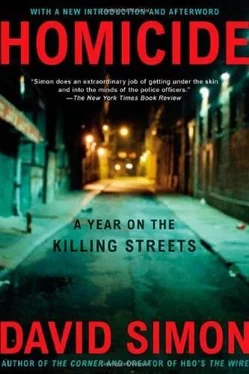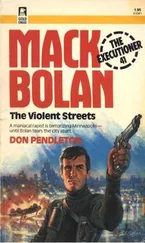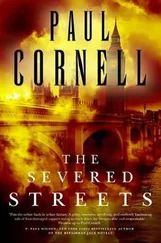“John Nathan,” Edgerton repeats, writing it down. “Where’s he live?”
“I think Catherine Street, right off Frederick.”
“He deals?”
“Yeah. You all have locked him up.”
The detective nods, then closes the notepad. There is only so much cooperation that a detective can expect at the scene of a drug murder, and this kid has just exceeded Edgerton’s monthly quota. Instinctively, the dealer reaches over to close the bargain with a handshake. A strange gesture. Edgerton responds, then offers a last warning before opening the car door.
“If this doesn’t check out,” he says, sliding off the seat with the kid following him out of the car, “I know where to find you, right?”
The dealer nods agreement, then pulls the beret down on his forehead and disappears into the darkness. Edgerton takes another ten minutes to sketch his crime scene and asks the Southwest uniforms a few questions about the name he has just been given. If you see him on the street, he tells the patrolmen, pick his ass up and call homicide.
At half past three in the morning, Edgerton finally manages to get free for the four-block drive to Bon Secours and a visit with his dead man. He’s a big one, too-six-foot-one or so with a linebacker’s upper body and a tailback’s legs. A thirty-year-old addict who lived not a block from where he was shot, Gregory Taylor looks up at the ceiling of the ER through one glazed eye, the other having swollen shut from the fall on Payson Street. Catheters and tubes hang limply from every appendage, lifeless as the body to which they were attached. Edgerton notes the needle tracks on both arms as well as gunshot wounds to the right chest, left hip and upper right arm. All of the wounds appear to be entrances, though with a.22 slug, Edgerton knows, it’s hard to tell.
“He looks pretty mean, doesn’t he?” says the detective to a nearby uniform. “Big and mean. I guess that explains why there were two of them. I wouldn’t want to go out looking for this guy alone, even with a rifle. I’d definitely bring a friend.”
The physical evidence suggests two other things to the detective. One: The killing was an act of impulse rather than premeditation. Edgerton knows that from the weapons involved; no shooter with any semblance of professionalism would carry something as cumbersome as a.22 rifle to a planned drug killing. Two: The shooter was mightily pissed off at Gregory Taylor, ten shots fired being an obvious indication of displeasure.
Leaning over the dead man’s torso, Edgerton draws a human form on a fresh page of his notepad and begins marking wound sites. As he does, a heavyset trauma nurse, her face locked in that unmistakable get-out-of-my-emergency-room expression, walks across the ER, closing the plastic curtain behind her.
“Are you the detective for this one?”
“Yes.”
“Do you need his clothes?”
“Yeah, we do, thanks. There should be a uniformed officer here to bag those. I’ll see-”
“There’s one out in the waiting room with the mother,” says the nurse, obviously torn between the joys of irritation and the satisfactions of efficiency. “We’re going to need this bed soon.”
“The mother is here?”
The nurse nods.
“Okay, then. I need to see her,” says Edgerton, opening the curtain. “One other thing. He didn’t say anything in the ambulance or once he got here?”
“A-D-A-S-T-W,” says the nurse.
“What?”
“A-D-A-S-T-W,” she says with a certain pride. “Arrived dead and stayed that way.”
Beautiful. Is it any wonder that the easiest extramarital affair for a cop is with an emergency room nurse? What other relationship could be so psychologically symbiotic, so happily diseased in its perspective? Hell, if they ever get bored with the sex, they can always go to a motel room and give each other attitude. A-D-A-S-T-W.
Edgerton swallows his smile before pushing through the double doors to find the fifty-eight-year-old mother in the waiting room.
Pearl Taylor takes the detective’s hand but says nothing. Edgerton is usually good with the grieving mothers. An attractive, well-dressed man with carefully coifed salt-and-pepper hair and a rich, sonorous voice, he is a walking, talking reminder of the son they never managed to raise. Faced with black male defendants and juries of black women, city prosecutors love to get Edgerton on the witness stand for that very reason.
“I’m very sorry about your son.”
The mother shakes her head quickly, then releases the detective’s hand.
“We think this happened,” says Edgerton, choosing his words with care, “because of an argument that might have had to do with-”
“Drugs,” she says, finishing the sentence. “I know it.”
“Is there anyone your son might have had a disagreement…”
“I don’t know anything about his business,” she says. “I can’t help you with that.”
Edgerton contemplates another question, but the woman’s plaintive expression changes his mind. It’s as if she’s waited for this moment for years, waited so long that its arrival can be greeted with familiarity as much as grief.
“I’ll do my best,” Edgerton tells her, “to find the person responsible.”
She looks at him strangely, then shrugs a shoulder before turning away.
TUESDAY, MAY 10
“Homicide,” says Edgerton. “How’s it going?”
“It’s going,” says the desk sergeant, unimpressed. “Nah, fuck that. It’s more than going. It’s gone. It’s fuckin’ history.”
“That bad, huh?”
“What can I do you for?”
“Got a writ for a prisoner,” says Edgerton, pulling out a custody form signed by a state’s attorney and tossing it on the Southwestern booking desk. Peering at the writ over the top of his reading glasses, the desk sergeant grunts, coughs, then grinds a cigarette into an overburdened ashtray. He takes the paper slip and steps back, checking the name against the cellblock prisoner log.
“Gone to city jail,” the sergeant says.
“You all just called and told me he was here,” says Edgerton. “When was your wagon run?”
The sergeant rechecks the name, then walks over to the cellblock door. Calling for the turnkey, he passes the paper through the bars, nods an acknowledgment to the man on the other side, then walks back toward the detective. Edgerton watches each labored movement, caught between amusement and exasperation. The Midnight Dance of the Universal Desk Sergeant, a performance that is somehow the same whether the precinct house is in Boston or Biloxi. Was there ever a desk sergeant who didn’t peer out over reading glasses? Was there ever a desk man who wanted to be bothered with police work at three in the morning? Was any station house desk ever manned by anything but aging civil servants, six months from their pensions, whose every movement seemed slower than death itself?
“Yeah, John Nathan. We got him,” the sergeant says finally. “He gave us a slightly different name.”
“Okay then.”
“You want him carryout, right?”
“Yeah, he’s going downtown.”
Five minutes more and the cage door opens for a dark-skinned, pear-shaped kid, who steps slowly into the light of the booking area. Edgerton looks at the bloated little wonder that is his eyewitness and knows immediately that the Hollins Street murder is going down. He knows this from the kid’s demeanor. Because not only was this brain-dead corner boy clever enough to get locked up on a drug charge two hours after the shooting, he’s now standing here looking more sheepish than sullen. Three A.M. and the boy can’t even manage a decent eyefuck; when Edgerton pulls out his cuffs, the kid actually pushes his arms forward, palms up.
Читать дальше












